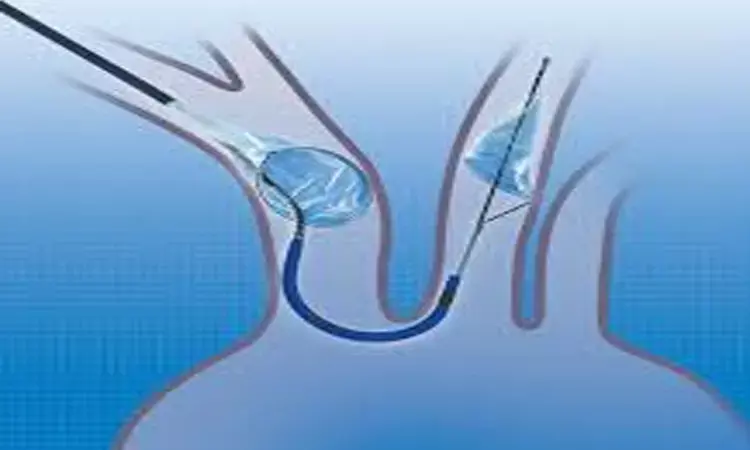- Home
- Medical news & Guidelines
- Anesthesiology
- Cardiology and CTVS
- Critical Care
- Dentistry
- Dermatology
- Diabetes and Endocrinology
- ENT
- Gastroenterology
- Medicine
- Nephrology
- Neurology
- Obstretics-Gynaecology
- Oncology
- Ophthalmology
- Orthopaedics
- Pediatrics-Neonatology
- Psychiatry
- Pulmonology
- Radiology
- Surgery
- Urology
- Laboratory Medicine
- Diet
- Nursing
- Paramedical
- Physiotherapy
- Health news
- Fact Check
- Bone Health Fact Check
- Brain Health Fact Check
- Cancer Related Fact Check
- Child Care Fact Check
- Dental and oral health fact check
- Diabetes and metabolic health fact check
- Diet and Nutrition Fact Check
- Eye and ENT Care Fact Check
- Fitness fact check
- Gut health fact check
- Heart health fact check
- Kidney health fact check
- Medical education fact check
- Men's health fact check
- Respiratory fact check
- Skin and hair care fact check
- Vaccine and Immunization fact check
- Women's health fact check
- AYUSH
- State News
- Andaman and Nicobar Islands
- Andhra Pradesh
- Arunachal Pradesh
- Assam
- Bihar
- Chandigarh
- Chattisgarh
- Dadra and Nagar Haveli
- Daman and Diu
- Delhi
- Goa
- Gujarat
- Haryana
- Himachal Pradesh
- Jammu & Kashmir
- Jharkhand
- Karnataka
- Kerala
- Ladakh
- Lakshadweep
- Madhya Pradesh
- Maharashtra
- Manipur
- Meghalaya
- Mizoram
- Nagaland
- Odisha
- Puducherry
- Punjab
- Rajasthan
- Sikkim
- Tamil Nadu
- Telangana
- Tripura
- Uttar Pradesh
- Uttrakhand
- West Bengal
- Medical Education
- Industry
Cerebral protection system reduces stroke risk in patients undergoing TAVR: JACC

USA: The use of the Sentinel cerebral protection system (CPS) in patients undergoing TAVR lowers the risk of in-hospital mortality and ischemic stroke, suggests a recent study in the journal JACC: Cardiovascular Interventions. Further, the use of CPS did not increase the risk of procedural complications but increased the cost of the index hospitalization.
Sentinel CPS is the only device approved by the US FDA for cerebral embolic protection. However, the role in the prevention of clinical ischemic stroke has been controversial. To have some clarity on the same, Michael Megaly, Abbott Northwestern Hospital, Minneapolis, Minnesota, and colleagues evaluated in-hospital outcomes with the use of the Sentinel cerebral protection system in patients undergoing transcatheter aortic valve replacement (TAVR).
The researchers queried the Nationwide Inpatient Sample database from the last three quarters of 2017 after the approval of the Sentinel CPS device, for identifying the TAVR hospitalizations.
The Nationwide Inpatient Sample database from the last three quarters of 2017, after the approval of the Sentinel CPS device, was queried to identify hospitalizations for TAVR. A 1:2 propensity score-matched analysis to compare in-hospital outcomes with versus without the use of the CPS. A total of 36,220 weighted discharges of patients who underwent TAVR (525 with the CPS and 35,695 without) were identified.
The primary outcome was the occurrence of ischemic strokes.
Key findings of the study include:
- The overall percentages of ischemic and hemorrhagic strokes were 2.4% and 0.2%, respectively.
- After propensity score matching (525 CPS, 1,050 no CPS), the risk for ischemic stroke was lower with use of the CPS (1 % vs. 3.8%,).
- The cost of the index hospitalization was higher with use of the CPS ($47,783 vs. $44,578).
- In multivariate regression analysis, use of the CPS was independently associated with a lower risk for ischemic stroke.
"Use of the Sentinel CPS in patients undergoing TAVR is associated with a lower incidence of ischemic stroke and in-hospital mortality, without an increased risk for procedural complications but with an increased cost of the index hospitalization," concluded the authors.
The study, "Ischemic Stroke With Cerebral Protection System During Transcatheter Aortic Valve Replacement," is published in the journal JACC: Cardiovascular Interventions.
DOI: https://interventions.onlinejacc.org/content/13/18/2149
Dr Kamal Kant Kohli-MBBS, DTCD- a chest specialist with more than 30 years of practice and a flair for writing clinical articles, Dr Kamal Kant Kohli joined Medical Dialogues as a Chief Editor of Medical News. Besides writing articles, as an editor, he proofreads and verifies all the medical content published on Medical Dialogues including those coming from journals, studies,medical conferences,guidelines etc. Email: drkohli@medicaldialogues.in. Contact no. 011-43720751


